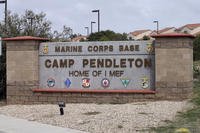A former secretary of defense under President Bill Clinton told a Senate panel on Wednesday that going ahead with development and deployment of the long-range standoff cruise missile only makes nuclear holocaust more likely.
"We're now today on the threshold of a new Cold War. We're on the threshold of a new nuclear arms race, and in addition but not related to that there's a rising threat of nuclear terrorism and a regional nuclear war," former Defense Secretary William Perry said. "For all these reasons, I assert today the likelihood of a nuclear catastrophe is actually greater than it was during the Cold War."
Perry, who served as Pentagon chief from 1993 to 1997, supported a modernization of the country's nuclear triad, but said that could be done without the LRSO. "We can reject a modernization program that would increase the risk of a nuclear war by accident or miscalculation," he said.
Perry's warnings against moving ahead with the LRSO were not shared by the panel's other witnesses, former Clinton Deputy Defense Secretary John Hamre and Franklin Miller, who served as special assistant on defense policy and arms control to President George W. Bush.
Hamre said the LRSO, which could be air-launched from about 1,500 miles from its target, is less provocative than intercontinental ballistic missiles and would be flown aboard aircraft that, if necessary, could be recalled before launch.
He also rejected Perry's contention that cruise missiles, because they carry both nuclear and conventional bombs, could confuse a potential adversary who might respond to a conventional bomb launch with a nuclear weapon.
"I do not think it's a plausible argument that people will be confused about what we're doing," he said.
Miller agreed.
"The launch of a conventional weapon and the launch of a nuclear weapon occur in context," he said. "So the launch of [U.S.] cruise missiles against Iraq or indeed the launch of Russian cruise missile against Syria did not raise any questions of nuclear use."
Russia rebuilding nuclear forces
Both men also pointed out that Russia is busy rebuilding its conventional and nuclear forces, already has new weapons deployed, and that Russian President Vladimir Putin has said Russia would launch a nuclear first strike if it believed its territory was threatened.
Russia has also engaged in military exercises designed to combat U.S. and European allies, they said.
Perry has made his opposition to the LRSO known for some time. He told lawmakers that to go ahead with the weapon is to accept the heightened dangers of a nuclear catastrophe as inevitable.
"Should we accept it as inevitable? If not, where do we draw the line?" he asked. He also said that if he believed not having the LRSO would jeopardize the U.S.'s ability to deter a nuclear threat from any adversary, he would support it.
Advocates of the LRSO believe it is necessary to ensure that the U.S. can strike deep into contested airspace with a nuclear weapon if necessary without relying on manned bombers.
The modernization program, including the LRSO, has backing from much of Congress and the White House.
Hamre also noted that the program already is fully funded.
"It's not about trying to use it," Hamre said, "It's about having flexibility."
"Nobody ever talks about the impact of these [weapons], about what they do," said ranking member Sen. Dianne Feinstein, D-California. "It's always deterrence, it's always more, more, more, newer, newer, newer. … It's hard for me to accept this as the answer, because the answer to it really lies in reason and understanding and diplomacy and work between leaders."
What is not needed, she said, is a "hardening of attitude when both sides are developing new nuclear weapons."
As a woman, she said, she thinks about what the nuclear bombs "would do if dropped."
"It's not mentioned by the men -- ever," she said. "But it's a very big deal if you vote for this."
Bearing responsibility
Perry has been open about his opposition to the LRSO for some time.
Though he agrees that with the rise of Vladimir Putin Russia has engaged in reckless actions -- in particular in Georgia, Crimea and Ukraine -- he said the U.S. bears some responsibility for its current relationship with Russia.
He told the panel that "a series of questionable policy decisions in the United States alienated us from Russia" starting in the 1990s.
Though none of the lawmakers asked and he did not elaborate, Perry has previously said that warming relations and cooperation that the U.S. and Russia enjoyed after the collapse of the Soviet Union began to fall apart when the U.S. moved aggressively to expand NATO into Eastern Europe.
President George H.W. Bush, in office when the Soviet Union collapsed, reportedly had pledged NATO would not push eastward. That changed during Clinton's presidency.
Perry said that in the first years after Russia shook off communism. the U.S. and Russia cooperated in dismantling 8,000 nuclear weapons, and Russia even embedded a brigade into an American military division for a peacekeeping mission in Bosnia.
"So at that time I believed we had ended the Cold War, that we ended the threat of a nuclear holocaust. That was not to be," he told lawmakers.
-- Bryant Jordan can be reached at Bryant.jordan@military.com. Follow him on Twitter at@BryantJordan.


























